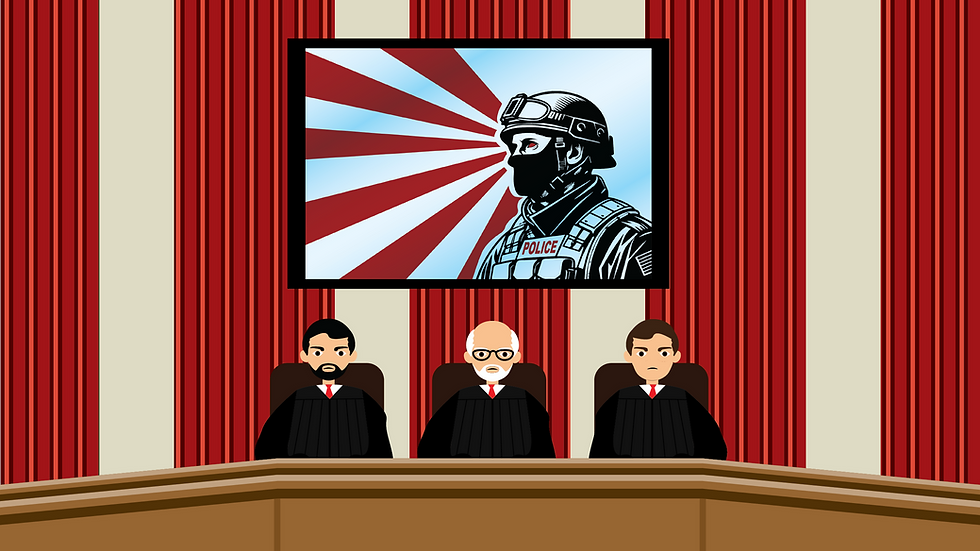9th Circuit breaks from precedent, lets Trump continue using the national guard in Los Angeles
- Kyle Ferreira

- Jun 26, 2025
- 4 min read

The 9th Circuit Court of Appeals charted an unprecedented course toward the judiciary deferring to the president's judgment about his own abuses of power.
On June 19, the 9th Circuit overturned a California district court’s order and allowed Trump to continue to use the military to enforce the law in Los Angeles.
It held that courts must give "significant deference" to a president's conclusions about whether exigent circumstances exist that meet the requirements of the law—such as the existence of a rebellion or invasion.
Following the largely peaceful protests in Los Angeles on June 7, the Trump administration invoked Title 10 Section 12406 and took control of the California national guard to deploy them to the city.
Gavin Newsom, the governor of California, subsequently sued the Trump administration. The district court held that Trump had exceeded his authority under the law and ordered him to return control of the national guard to Newsom.
However, the 9th Circuit reversed and announced a new rule: the president is entitled to "significant deference" in determining whether he is acting within his authority under Title 10 Section 12406.
Abdicating the power of the judiciary
The 9th Circuit holding runs afoul of a fundamental constitutional principle.
"It is emphatically the province and duty of the judicial department to say what the law is," said the Supreme Court in the landmark case Marbury v. Madison.
This statement embodies the principle that the judiciary decides questions of law and that includes reviewing the actions of the executive.
“The responsibility of determining the limits of statutory grants of authority ... is a judicial function entrusted to the courts," the Supreme Court said in Stark v. Wickard.
Other circuit courts of appeals have consistently treated this as settled law.
"An essential ingredient of our rule of law is the authority of the courts to determine whether an executive official or agency has complied with the Constitution and with mandates of Congress which define and limit the authority of the executive," the D.C. Circuit Court of Appeals said in Committee for Nuclear Res., Inc. v. Seaborg.
The 9th Circuit pays mere lip service to this rule. In practice, its decision marks a significant departure from this fundamental principle by deferring to a president's determination of whether he has met the legal requirements for taking control of the national guard
“The statutory terms for federalizing California’s militia here are unmet,” the California Constitution Center said in its brief to the district court. “Absent that statutory and constitutional authority, the president exceeds his power in seizing command of the militia.”
If the courts must defer to the president's conclusions about whether his own actions have violated the law, the ability of the courts to be a check on abuses of presidential power will be greatly diminished.
What are the limits of this deference?
For its part, the 9th Circuit has not thrown off all limits on presidential power.
"[The Supreme Court’s holding in] Martin does not compel us to accept the federal government’s position that the president could federalize the national guard based on no evidence whatsoever and that courts would be unable to review a decision that was obviously absurd or made in bad faith," the 9th Circuit said.
But even regarding deference to a president’s factual findings, the standard the 9th Circuit applied contradicts the degree of deference the Supreme Court has recognized.
“It is vital in this context ‘not to substitute . . . our own evaluation of evidence for a reasonable evaluation by the legislative [or executive] branch,’” the Supreme Court said in Holder v. Humanitarian Law Project.
The bar that the 9th Circuit set is significantly lower than Supreme Court precedent requires. According to the 9th Circuit decision, the president’s conclusions need not be reasonable or even rational.
In this very case, the 9th Circuit upheld Trump’s use of the national guard despite the fact that the acts of violence upon which Trump justified his actions were few and far between.
According to the district court, only 11 protestors were arrested for unlawful actions on June 7. Meanwhile, more than 1600 protestors had participated in the protest.
The district court rejected the idea that a president has near unilaterally authority to decide when civil unrest becomes a rebellion.
“The [district] court is troubled by the implication inherent in defendants’ argument that protest against the federal government, a core civil liberty protected by the First Amendment, can justify a finding of rebellion.”
But the 9th Circuit disagreed and held that such minimal civil unrest was nonetheless enough to support Trump’s conclusion that sending in the national guard was justified.
Consequences
If so little evidence is required to be deserving of deference to the president, then the president—not the courts—is effectively the judge of whether he has exceeded his own power.
This upsets the delicate system of checks and balances that United States democracy depends on to prevent the arbitrary use of power.
For all intents and purposes, the 9th Circuit decision bestows upon the president the broad discretion to decide whether he has abided by the law while nearly excluding review by the courts.
In Hamdi v. Rumsfeld, the Supreme Court emphatically rejected such a principle as antithetical to the separation of powers.
“The position that the courts must forgo any examination of the individual case … cannot be mandated by any reasonable view of separation of powers, as this approach serves only to condense power into a single branch of government.”









